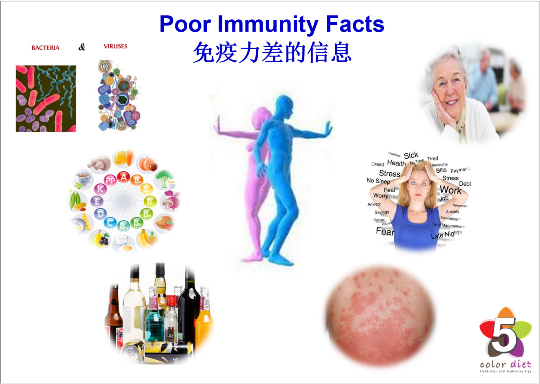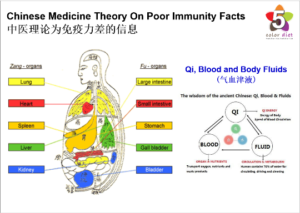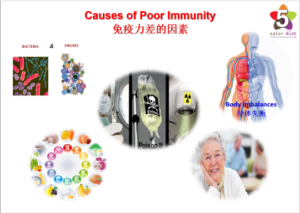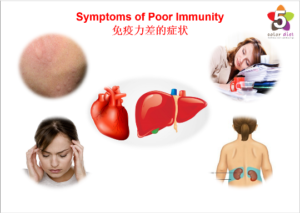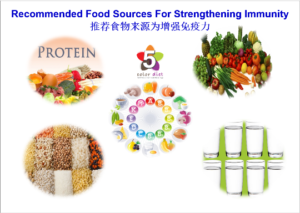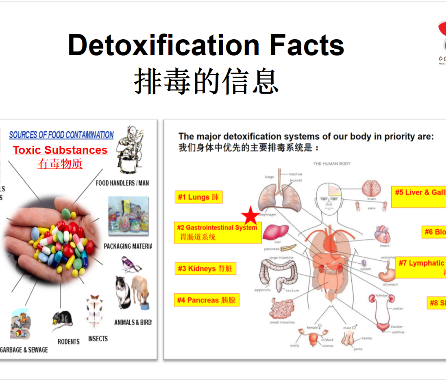
Poor Immunity Overview
Some people are just blessed with a good set of genes that ensure a strong immune system. For others who are not as fortunate, they must work for immunity by observing proper nutrition, sufficient rest, a healthy active lifestyle, plenty of sun and reduced stress. Recent studies have shown that getting enough of these while cutting down on unhealthy habits and avoiding processed foods restores the immune system to peak performance.
The immune system is made up of several organs including your spleen, tonsils, bone marrow & lymph nodes. These organs make and release lymphocytes, which are white blood cells classified as B cells & T cells. B & T cells fight invaders called antigens. Examples of antigens are bacteria, viruses, cancer cells, or bodily fluids from a sick person. B cells release antibodies specific to the diseases your body detects. T cells kill off the cells in your body that are being attacked by diseases.
Our immune system is responsible for warding off bacterial, fungal and viral infections that cause diseases and illnesses, such as influenza, thrush and herpes. Immune system impairment can cause a variety of symptoms including fatigue, muscle weakness, susceptibility to infection, tissue inflammation, poor wound healing and heightened allergic reactions.
Immunodeficiency disorders prevent your body from being able to fight infections and diseases the way it should. An immunodeficiency disorder makes you considerably more susceptible to catching viruses & bacterial infections. The first indicator that something is wrong with your immune system is becoming repeatedly and chronically sick, even with minor illnesses, including pinkeye, sinus infections, or diarrhea. If these problems don’t respond to treatment or don’t completely get better over time, your doctor might test you for a disorder. Recurrent pneumonia and yeast infections could also suggest you have a disorder.
The immune system’s natural capacity to detect & destroy abnormal cells may prevent the development of many cancers. However, some cancers are able to avoid detection and destruction by the immune system. They may produce signals that reduce the immune system’s ability to detect and kill tumor cells, or they may have changes that make it harder for the immune system to recognize & destroy them.
Everyone’s immune system is unique. Each person’s physiology responds to active substances differently. Nothing is more important to your health than a well-functioning immune system. Modern conventional medicine battles diseases directly by means of drugs, surgery, radiation and other therapies, but true health can be attained only by maintaining a healthy properly functioning immune system and using natural remedies can help to strengthen the ability to fight diseases.
Chinese Medicine views the body as a dynamic system of interrelated parts working together as a whole. The zang organs: lungs, spleen, kidneys, liver and heart (also named as the five solid organs) are at the core of the immune activities. They combine with the tissues, viscera (organs), meridians, Qi (Vital energy), blood & body fluids and are the center of the whole immune process. When the immune system functions normally, health can be maintained otherwise body imbalances will occur. Chinese Medicine treats body imbalances with acupuncture, natural herbs, food diet therapies and exercises like Tai Chi, Qigong & meditation.
More references at: Body Constitution Types And Right Food Diet Facts.
-
Causes Of Poor Immunity
● Aging: The immune system loses its ability to fight off infections as you grow older. This increases your risk for getting sick easily which is why we need to go for regular health check-ups to prevent chronic health problems eg: high blood pressure, cholesterol, diabetes, etc.
● Alcohol: Excessive consumption impairs the immune system and increases vulnerability to lung infections.
● Autoimmune diseases: In autoimmune diseases, the body attacks normal healthy tissues. The cause is unknown. It is probably a combination of a person’s genes and something in the environment that triggers those genes. Immune system disorders cause abnormally low activity or over activity of the immune system. In cases of immune system over activity, the body attacks and damages its own tissues (autoimmune diseases). Immune deficiency diseases decrease the body’s ability to fight invaders, causing vulnerability to infections. Examples are inflammatory bowel disease, lupus, multiple sclerosis, pernicious anemia, psoriasis, rheumatoid arthritis & Type 1 diabetes, etc.
● Chemotherapy & Radiotherapy: Chemotherapy & Radiotherapy are the most common cause of a weakened immune system in people getting cancer treatment. They can cause low white blood cell counts which increases the risk for infections.
● Drug medications: Drug medications can lower the immune system eg: antibiotics destroy the healthy bacteria in our stomachs which are essential for healthy digestion. Instead turn to natural alternatives.
● Environmental factors: Air pollution, climate changes, genetic modified foods, heavy metal from industrial sites eg: gases, arsenic, lead, etc can cause abnormalities in cell growth and reproduction, leading to the development of cancer cells, therefore weaken the immune system too.● Infections: Infections such as the flu virus, mono (mononucleosis), and measles will weaken the immune system.
● Lack of sleep: Lack of sleep reduces your immune defenses because when you sleep, your body produces proteins that help your immune system fight infections.
● Nutritional deficiencies: Lack of Proteins, Folic Acid (Vitamin B9), Vitamin A (Vitamin A deficiency is associated with impaired immunity and increased risk of infectious disease), Vitamin B complex (B1, B2, B3, B4, B5, B6, B7, B8, B9, B12), Vitamin C, Vitamin D, Vitamin E, Selenium & Zinc.
● Overweight: Being overweight has a major effect on your immune system. One study found that the white blood cells in overweight people were not as able to fight off infections as those of their healthy-weight peers.
● Recurrent infections: Recurrent infections may be a sign of an immunodeficiency disorder. An immunodeficiency happens when your body lacks the ability to produce antibodies which functions are to destroy bacteria & pathogens.
● Smoking: Smoking undermines basic immune defenses, raises the risk of bronchitis & pneumonia and middle ear infections in kids.
● Surgeries: Any type of major surgery can stress the body & suppress the immune system within hours of surgery. Anesthesia (the drugs used to make the patient sleep) may play a role. It might take from 10 days to many months for an immune system to recover completely. Surgery also breaks the skin & mucous membranes and can expose internal tissues to germs. During this period, you are more prone to infections that can affect any area of the body, such as: sinuses, throat, mouth, lungs, skin & urinary tract, etc.
● Stress: Physiological & physical stress can add pressure to our immune system. When long term stress becomes chronic, many systems in the body are affected. Chronic stress results in high levels of cortisol and other corticosteroids circulating in the blood for a long period of time. People who suffer from chronic or long term stress can experience symptoms like anxiety, depression & sleep problems. Physically, they risk high blood pressure, heart disease & digestive problems, etc. Another danger they face is a weakened immune system.
● Body imbalances: Body imbalances will cause health problems like cardiovascular problems (Eg: atherosclerosis, low blood pressure, high blood pressure, etc), poor blood circulation, gastrointestinal system problems (Eg: bloatedness, diarrhea & indigestion, etc), kidney problems (Eg: Chronic ear problems, chronic nephritis, chronic urogenital problems & hormonal dysfunction, etc), liver problems (Eg: vision problems, gallstones & high cholesterol, etc), respiratory tract problems (Eg: Asthma, cold, flu & hypoxia, etc) and skin problems (Eg: acne, dry skin, ezcema & psoriasis, etc). -
Symptoms Of Poor Immunity
● Asthma, bronchitis & hypoxia, etc.
● Abdominal pain, bloatedness, constipation, diarrhea & indigestion, etc.
● Chronic fatigue, nausea, etc.
● Cold, flu & cough, fever, etc.
● Headaches, migraines, tension or cluster headaches, headaches associated with menstruation, etc.
● Heart problems eg: atherosclerosis, low blood pressure, high blood pressure, etc.
● Kidney problems eg: Chronic ear problems, chronic nephritis, chronic urogenital problems & hormonal dysfunction, etc.
● Liver problems eg: vision problems, gallstones & high cholesterol, etc.
● Sore muscles.
● Skin allergies.
● Stools that turn black suddenly & last for weeks or months.
● Weight gain or weight loss. -
Recommended Foods Sources For Strengthening Immunity
● Nutritional deficiencies foods as follows:
(1) Proteins: Proteins help to promote growth, increase energy & cell regeneration. Foods high in Proteins are beans, fish, milk products (cheese, eggs, milk, yogurt), nuts, poultry, meat, seeds, vegetables (eg: artichokes, broccoli, corn, Brussels sprouts, green peas, kale, mushrooms, spinach, sprouts), whole grains, etc.
(2) Vitamin A: Acts as antioxidant against free radicals; eye health; growth & development of bone, teeth & body cells; immune system; maintenance of healthy skin, nails, hair & mucous membranes and protects cells against cancer, etc. Foods high in Vitamin A are animal kidneys & livers, apricots, beets, cod liver oil, dairy products (butter, cheese, eggs, milk, yogurt), fish, green/ red/ orange/ yellow fruits & vegetables and meat, etc.
(3) Vitamin B complex: B vitamins help the body convert food into glucose, which provides energy to the body. Fat & protein metabolizing is also aided by B vitamins, as well as healthy nervous system functioning. Foods high in Vitamin B complex are animal livers, brewer’s yeast, dairy products (butter, cheese, eggs, milk, yogurt), meat & poultry, nuts, seeds, wholegrains, green leafy vegetables & fruits, etc.
(4) Vitamin C: It is a potent antioxidant which helps to reduce free radical damage to immune cells; helps suppress histamine by reducing the symptoms of colds & allergic reactions; helps in strengthening collagen & in collagen synthesis and accelerate wound recovery. Helps in amino acids metabolism & iron absorption. Helps to promote vascular health. Helps to protect & preserve the structure of capillaries, which will help prevent bruising, varicose veins & hemorrhoids. Helps to prevent blood clotting & platelet clumping by making the blood less sticky. Foods high in Vitamin C are herbs, fruits & vegetables (Eg: Berries, broccoli, brussels sprouts, capsicum, cauliflower, citrus fruits, dark leafy green vegetables, green peas, guava, honeydew, kiwi fruit, papaya, pineapple & tomatoes, etc).
(5) Vitamin D: Maintains bone health & helps to promote bone mineralization. It is also used for conditions of the heart & blood vessels, including high blood pressure & high cholesterol. Foods high in Vitamin D are Dairy products (butter, cheese, eggs, milk, yogurt), fish eggs, fish liver oil, oily fish (cod, herring, mackerel, salmon, tuna), etc.
(6) Vitamin E: It helps to treat and prevent diseases of the heart & blood vessels including hardening of the arteries, heart attack, chest pain, leg pain due to blocked arteries & high blood pressure. Foods high in Vitamin E are found particularly in fruits & vegetables. Eg: Apricot, asparagus, avocado, basil, beets, cereal, eggs, green vegetables, broccoli, canola oil, chili, chye sim, kale, kiwi, mango, meats, nuts, olive oil, oysters, parsley, poultry, pumpkin, seeds, shellfish, spinach, tomatoes, turnip greens, vegetable oils & wheat germ oil, etc.
(7) Selenium: Works with Vitamin E to protect body from oxidation. Selenium is used for diseases of the heart & blood vessels, including stroke and “hardening of the arteries” (atherosclerosis). It is also used for preventing various cancers including cancer of the prostate, stomach, lung & skin. Foods high in Selenium are asparagus, barley, brewer’s yeast, broccoli, cabbage, Chinese barley, eggs, fish, garlic, mushrooms, mustard seeds, nuts, onions, poultry, seafood, seeds, spinach, Swiss chard, wheat germ & whole grains, etc.
(8) Zinc: It helps to boost the immune system, treating the common cold, recurrent ear infections & preventing lower respiratory infections. It is also used for malaria & other diseases caused by parasites. Foods high in Zinc are beans, brewer’s yeast, brown rice, cashew nuts, cereals, cocoa, dairy products (cheese, milk & yogurt), egg yolks, flaxseeds, garlic, green peas, mushrooms, nuts, poultry, quinoa, red meat, seafood, seeds, spinach & wheat germ, etc.
● Immune-supportive herbs: If you get recurrent infections, consider taking immune-supportive herbs eg: Aloe Vera, American Ginseng, Astragalus, Danshen, Echinacea, Linzhi, Panax Ginseng, Siberian Ginseng, etc.
● Plenty of raw fruits & vegetables: Try to take 2 servings of fruits & 3 servings of vegetables daily in red, orange/yellow, green, black/ purple & blue and white & brown colors.
● Probiotics foods (Acidophilus, brewer’s yeast (Bovril, marmite, vegemite), coconut water kefir, dark chocolate, fermented foods: goat yogurt called kefir, kimchi, kombucha, miso paste, pickles, sauerkraut (fermented cabbage), tempeh & yogurt, etc): They contains good bacteria which helps to reduce respiratory tract & gastrointestinal problems by neutralizing bad bacteria & promote good bacteria in your gut. Also, it helps to strengthen white blood cells & helps the immune system in producing antibodies. One study found that people who take these foods daily can help to avoid colds, hay fever & diarrhea.
● Water: Drink 8 to 10 glasses of water daily which includes any beverages or soups to prevent dehydration.
● Others: Detox our body naturally by following the major detoxification systems of our body in priority: (1) Lungs detox (2) Gastrointestinal system detox (3) Kidneys detox (4) Pancreas detox (5) Liver & Gall bladder detox (6) Blood detox (7) Lymphatic System detox and (8) Skin detox.● Others: Exercise minimum 30 minutes at 3 to 5 times weekly will help to promote good circulation & metabolism which will contribute to a healthy immune system. Do not over exercise because too much exercise can wear you down & create immune system problems.
● Others: Meditation daily to calm the nerves, emotional mood imbalances & reduce stress, etc.
● In summary, daily meal with 1/2 plate of 5 color vegetables (50% green, 20% red/ black/ purple/ blue, 20% white/ brown & 10% orange/ yellow), 1/4 plate of proteins (fish, chicken, beans, nuts, seeds but lesser on red meat) & 1/4 plate of unrefined whole grains (cereals, oats and gluten-free grains like amaranth, brown rice, buckwheat, millet & quinoa, etc).* Recommendations: Try our natural tea remedies for Strengthening Immunity (1) Cordyceps Flowers Danshen Goji Berries Tea (For Cold Body System). (2) Cordyceps Flowers Danshen Tea (For Heaty Body System).
-
Foods To Avoid Or Least Intake Of Poor Immunity
● Alcohol: Excessive consumption impairs the immune system and increases vulnerability to lung infections. Take in moderation eg: ½ glass of red wine for healthy immune system provided you do not have any chronic health problems.
● Unhealthy Fats: Unhealthy fats like butter, lard, margarine, palm oil & peanut oil can contribute to weight gain, heart problems & other chronic diseases except coconut oil, flaxseed oil, olive oil & sesame oil, etc.
● Acidic forming foods: It will cause our body to be more acidic as over acidity can decrease the body’s ability to absorb minerals and other nutrients, decrease the energy production in the cells, decrease its ability to repair damaged cells, decrease its ability to detoxify heavy metals, make tumor cells thrive, and make it more prone to health problems. Examples of acidic forming foods are alcoholic beverages, caffeine beverages, dairy products (Butter, cheese, eggs & milk Except yogurt), meat, poultry, preserved foods, processed foods, salt, saturated fats, spicy foods, sugar, etc.
● Common food Intolerances: Food intolerance or non-allergic food hypersensitivity, refers to difficulty in digesting certain foods. Examples of common food Intolerances are alcohol, citrus fruits, corn, fruits (mango, papaya), vegetables: nightshades (Eggplant, capsicum, potatoes & tomatoes), soy products (except miso paste & tempeh), sugar, wheat, etc.
● Cooking method: Preparation of foods in baking, barbecue, deep-frying & microwave can cause increases our exposure to cancer-causing ¬carcinogens known as PAHs and HCAs. These can damage the DNA in our genes, possibly leading to skin, liver, stomach and other types of cancer. Advisable to prepare foods in raw, steam or stir-fry only.
● Gluten foods: Gluten is a protein found in many grains including barley (Except Chinese Barley), rye, tricale, wheat products (biscuits, pastries & white bread), etc. In some people, gluten triggers an immune reaction and causes inflammation of the lining of the small intestine which can eventually interfere with the absorption of nutrients from food.
● Inflammatory foods: It cause phlegm or dampness. Examples of inflammatory foods are dairy products (Butter, cheese, eggs & milk Except yogurt), fruits (citrus fruits, mango, melons & papaya), vegetables: nightshades (Eggplant, capsicum, potatoes & tomatoes), cold beverages & foods, excess mushrooms & fungi, sugar, sweets, white-wheat flour products and excess of fermented, vinegar & yeast foods, etc.
● Refined carbohydrates: Avoid refined carbohydrates eg: biscuits, snacks, sugary foods & drinks, white bread, white rice, etc because refined and high glycemic index carbohydrates are rapidly broken down into simple sugars which are readily absorbed into the bloodstream, causing risky spikes in blood insulin levels.
● Raw or cold foods & beverages: Moderate intake of raw or cold foods & beverages because they may cause Qi stagnation (Low energy) & stomach Yin deficiency. Examples of are frozen foods, ice-creams, iced beverages & foods, raw meat, sashmi and white/ tan & brown fruits & vegetables.
● Spicy foods: Moderate intake of spicy foods & beverages because it may cause damp-heat, phlegm, Qi stagnation (Low energy) & Blood stagnation. Examples of spicy foods are anise, basil, cardomom, capsicum, cinnamon, coriander, dill, fennel, garlic, ginger, leek, onions, parsley, rosemary, sage & shallots, etc.
● Smoking: Smoking undermines basic immune defenses and raises the risk of bronchitis & pneumonia in everyone, and middle ear infections in kids. -
Supplementary For Strengthening Immunity
● Immune-supportive herbs: If you get recurrent infections, consider taking immune-supportive herbs eg: Aloe Vera, American Ginseng, Astragalus, Cordyceps, Danshen, Echinacea, Linzhi, Panax Ginseng, Siberian Ginseng, etc.
● Amino Acids, Vitamins & Minerals: Folic Acid, Multi-Enzyme, Vitamin A, Vitamin B2, Vitamin B6, Vitamin C, Vitamin D, Vitamin E, Probiotics with Prebiotics, Selenium & Zinc, etc.












